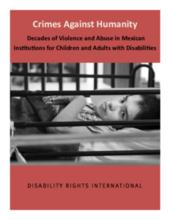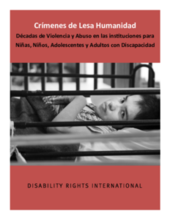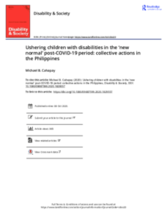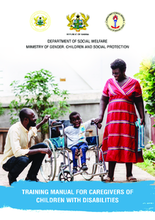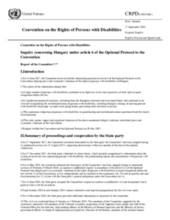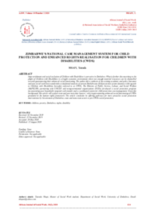Displaying 91 - 100 of 477
This paper reports on the results of an online survey of P2P stakeholders regarding: How text‐based support is being used in P2P programs and whether text‐based support is perceived as providing benefits to parents of children with disabilities.
The aim of this study was to estimate prevalence rates and adjusted rate ratios of exposure to violent parental discipline among children with and without disabilities in middle- and low-income countries.
This report documents severe and pervasive human rights violations against children and adults with disabilities in residential facilities in Mexico.
Este informe documenta violaciones graves y generalizadas a los derechos humanos de niñas, niños adolescentes y adultos con discapacidad en centros residenciales en México.
This issue paper describes the collective actions to usher children with disabilities in the new normal post-COVID-19 period in the Philippines.
This Training Manual for Caregivers of Children with disabilities has been developed to equip caregivers of children with disabilities (which include biological parents, foster parents, adoptive parents, caregivers in institutions, caregivers in day care centers, healthcare providers, teachers of special needs schools, etc.) with the needed knowledge and skill in order for them to be able to provide the required quality of care for the children for them to grow and develop well and become productive in society.
This paper provides a critical commentary on approaches to assessments of the capacity of parents of disabled children. International review of literature on this subject matter is enacted across three themes.
This report presents the findings from a visit conducted by the Committee on the Rights of Persons with Disabilities from 21 January to 1 February 2019. Findings include those regarding children with disabilities, including those in institutional care.
This study seeks to assess the prevalence of childhood neurodisabilities and related neurodevelopmental, emotional, behavioural and intellectual problems (NDEBIPs) among a cohort of children coming into care in an English local authority.
The author of this study did a synthesis of the existing academic and policy literature and uses social work lens to undertake a situational analysis of current Zimbabwean child protection system dynamics with regards to Children with Disabilities hereafter referred to as CWDs.

